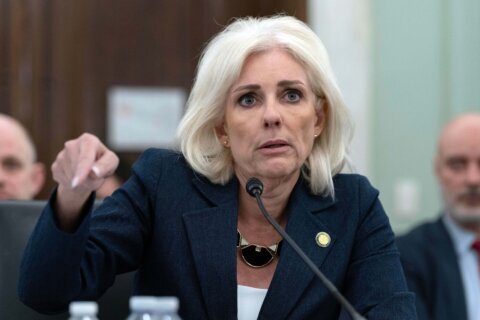The Virginia law allowing election officials to remove people from voter rolls if they are listed as noncitizens has led to controversy during this election cycle, but it was once a politically neutral issue.
John Aughenbaugh, a political science professor at Virginia Commonwealth University, said the law was championed by Ken Cuccinelli, who was then a Republican state senator and later became attorney general.
It was signed into law in 2006 by Democratic Gov. Tim Kaine.
“It was basically a bipartisan measure,” Aughenbaugh said.
Even though the law has been on the books for nearly 20 years, this is the first time it has become so contentious.
“In part, the reason why it became an issue is that the Biden administration became very skeptical of states purging their voter rolls in the aftermath of what Georgia did after the 2020 presidential election,” Aughenbaugh said.
A sweeping rewrite of Georgia’s election rules was signed into law in 2021 by Republican Gov. Brian Kemp, making numerous changes to how elections are administered, including adding a new photo ID requirement for voting absentee by mail.
Republican supporters said the law was needed to restore confidence in Georgia’s elections. But Democrats said it would restrict voting access, especially for voters of color.
“President Biden gave an infamous speech where he said that his Justice Department would not allow states like Georgia to reinstitute Jim Crow laws,” Aughenbaugh said. “This has been a point of emphasis for the Biden administration.”
The Justice Department filed a suit against Virginia earlier this month, arguing that making large-scale changes to voter rolls within 90 days of an election was against federal regulations.
Republican Gov. Glenn Youngkin and his administration took the case all the way to the Supreme Court, which ultimately sided with Youngkin on Wednesday.
Aughenbaugh said Youngkin’s administration “didn’t do anything unusual” in implementing the law.
What was unusual, according to Aughenbaugh, was Youngkin publicly drawing attention to the law and issuing an executive order “codifying” it exactly 90 days before this year’s election.
“If it wasn’t issued as an executive order and it didn’t get publicized, then perhaps it wouldn’t have caught the attention of the Biden administration,” Aughenbaugh said.
Aughenbaugh said state lawmakers could potentially make changes to the law, like having it paused within 90 days of an election, in order to prevent such a controversy in the future.
“I think the General Assembly should give some consideration to revising the law to avoid this kind of conflict,” Aughenbaugh said. “This is completely unnecessary.”
Get breaking news and daily headlines delivered to your email inbox by signing up here.
© 2024 WTOP. All Rights Reserved. This website is not intended for users located within the European Economic Area.








